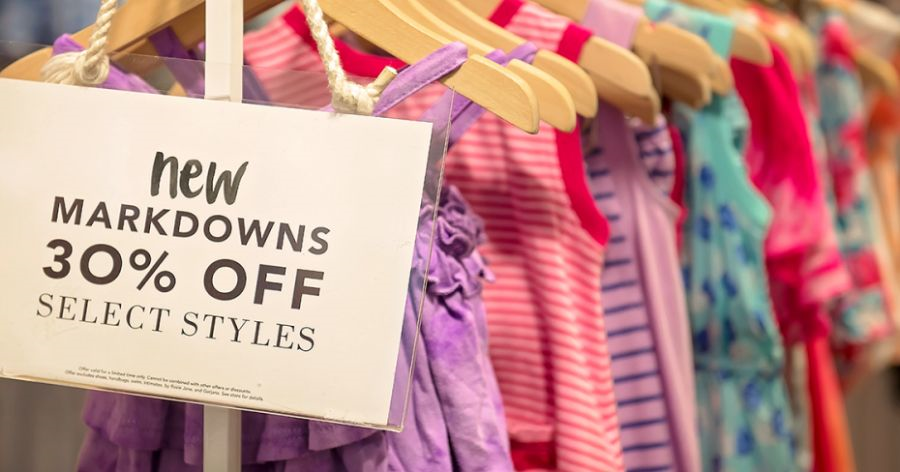It’s hard to resist the allure of sales (but here’s what you can do to try)
By: Maureen Genore on July 28, 2017
It’s mid-afternoon on a Friday. You’re at your desk working through those last few emails before the weekend, when a notification pops up on your phone. And even though you should be working, you can’t help but glance down to see your favourite clothing brand having a sale.
You know you don’t need any new clothes, and you also know that with your student loan, rent and cell phone bill all coming due next week, you don’t have much room in your budget for extras. But you just can’t help yourself. The words “FLASH SALE: EXTRA 25% off ALL clearance” are just too enticing.
We all know what happens next. Within a matter of minutes, you’ve purchased something you didn’t really need — all just because it was on sale. For some of us, this is more common than we’d like to admit.
Sales are hard to resist. I spoke with Claire Tsai, an associate professor of marketing at the University of Toronto's Rotman School of Management, to find out why we love sales so much and to get some tips on protecting yourself from making impulsive buying decisions.
As it turns out, we’re wired this way
In speaking with Tsai, I learned that it’s actually not entirely our fault that so many of us make impulsive spending decisions when faced with sales and promotions. As it turns out — this is actually considered normal behaviour.
“A lot of research, including my work, shows that people experience positive feelings when they encounter sales and promotions, and end up buying things that they don’t need but are enticed to by the great deals. It’s very common,” she explains.
“When people shop, they feel two things: the first is positive — happiness — in relation to the merchandise they’re getting. The second is negative — pain — when they have to make a payment for that merchandise.”
People feel these positive feelings, they feel excitement and even arousal when they encounter promotions and sales
And as you might have guessed, when things are on sale people believe they’re paying less for their goods, which in turn means they experience less pain when making their payment. And everyone wants to feel less pain, right?
“People feel these positive feelings, they feel excitement and even arousal when they encounter promotions and sales. The reality is, sales promotions will increase those positive feelings and decrease the negative ones,” Tsai explains.
Retailers are experts at getting us to spend money
Now that we know that we’re actually wired to feel good about spending — especially when we think we’re getting a great deal — it’s no surprise that retailers do everything they can to take advantage of that.
When it comes to tactics companies take to get people into their stores or onto their websites, there are plenty of common ones retailers use including in-store signage, email marketing campaigns and social media messaging.
But, as Tsai explains, there are also a few less traditional ones, too.
“Some places are very advanced — they might market towards you while you’re actually in a store through an online channel (an app, for example),” says Tsai.
The outcome? You might buy more than what you really need just because you received a notification about a sale to your phone.
“These tactics haven’t necessarily been widely adopted yet, but it’s also not uncommon. An example of this type of thing is Subway, who are very sophisticated marketers. When their customers walk by or are near their stores, they’ll send them a coupon, enticing them to come in.”
Luckily, there are ways to protect ourselves
There are a couple of things that consumers can do, though, to protect themselves from falling prey to unexpected spending.
First and foremost? Make a gameplan before you’re faced with temptation.
“Customers need to have the realization that it’s very, very hard to stop themselves or exert any kind of self control in the heat of the moment. It’s probably too late when they’re exposed to sales and promotions to stop themselves,” says Tsai.
One way to do this is to create a budget, whether it be weekly or monthly, and then stick to it. Tracking your spending and knowing where your money goes is one of the most powerful ways to avoid any impulse purchases.
When their customers walk by or are near their stores, they’ll send them a coupon, enticing them to come in
“People might set some kind of budget for shopping — like saying that each week they won’t spend more than $60 on lunches. If they have some kind of tracking in place, they’d know that by Friday if they only have $10 left, they shouldn’t splurge on an expensive lunch,” Tsai explains.
Other mechanisms that people can consider using to curb their spending, according to Tsai, have to do with their method of payment.
“It may be easier for people to exert self control when they’re paying with cash rather than with a credit card. The same goes for paying with an app on your phone; apps and credit cards don’t feel like money,” Tsai says.
If you know you’re prone to splurging on sales, putting your credit card away for a few weeks could yield results for you. Tsai says that paying with cash feels weightier — handing over money really hammers home you’re losing something.
“People can spend money using these methods (credit cards and apps) without too much pain,” she says. “Therefore, they’re far more likely to make impulsive purchases. Using cash makes people pause and think, and digital currency just doesn’t have the same effect on people. People sometimes won’t even check their bill for weeks after they make a purchase, making it a lot easier to justify.”
A charge card might be the answer. It requires you to pay your balance every month, meaning you won't be carrying balances month-to-month. See some options below.
See Cards


